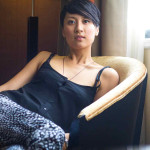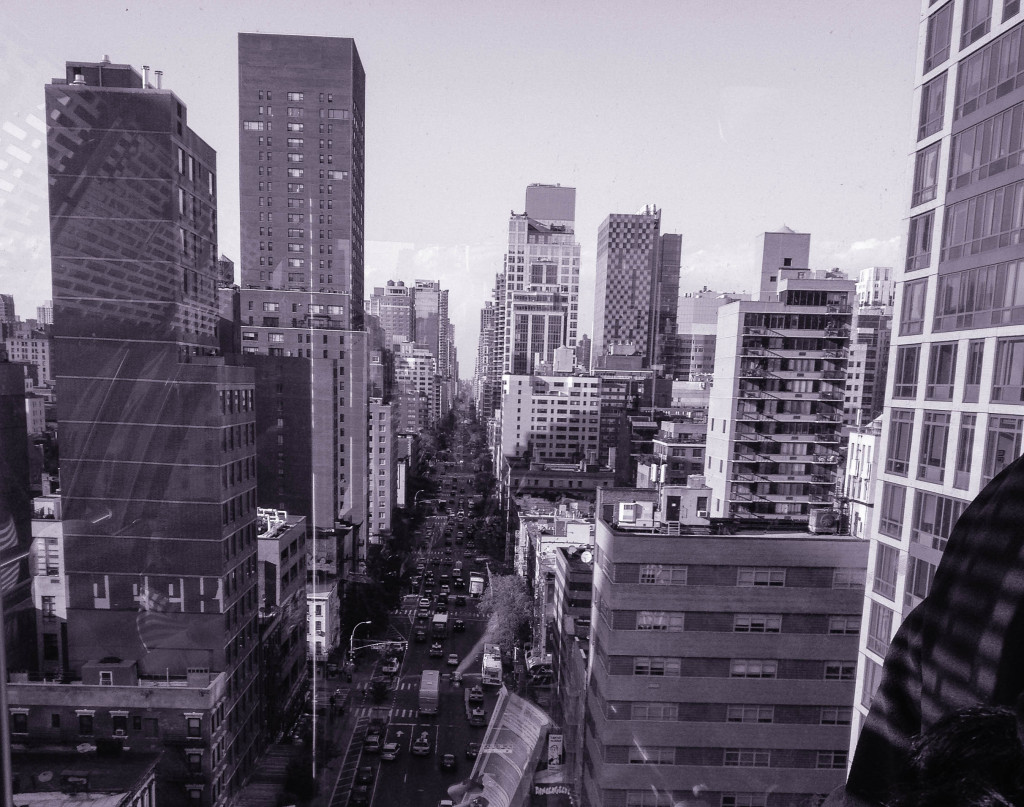with a nod to Maggie Nelson’s Bluets
- These are truths I know about New York.
- Many people have written about New York. It is a concentration of all towns, the citiest of cities. Contrary to popular belief, if you know how to make it in any other city, you can make it in this city.
- But I have some observations that may offer a different light. In these observations I will occasionally include observations of you.
- Mostly, I try not to think about you.
- But sometimes, while turning a corner, you will appear with your leather jacket, your fiery eyes; and I will bump into the person standing next to me and apologize for my imagination.
- Let me begin with an envisaging of the city. This is a city of hard surfaces and neon-lit advertisements, of money that rains green from the skies, of libraries whose corridors disappear you as you scuttle in from the street, of corporate robots, of luxury goods, of Apple stores. Of Alphabet Avenues, of Houston East and West, of Gramercys and Batterys. Of alley-less blocks and churches on corners sending God through every crucifix, of beans, rice and mustard, of chavas and kwengas, of Korean, Jamaican, Ecuadorian, Bangladeshi, Venezuelan, Nigerian, Japanese, Chinese, Dominican, Irish, Italian and Greek, of language and food. Of dollar donuts. Of yellow taxis. Of Times Square and Rockefeller and the Lincoln Center and the Met. Of performances in grand, majestic theatres, but also in subway cars, stations, on the street. A city of unidentifiable smells, fire escapes, broken pipes and broken heating, dank stairwells, garbage bags on the streets, uncollected dog poo, endless sirens, the homeless, crowded parks and free Wi-Fi. A city where, if one chooses, one can ignore all of the above and see only the artisan bread and imported coffee, brownstones, flea markets, poetry slams, bikram yoga, fixie bikes, and bad chai.
- And yet that still does not capture it. “There is a beautiful anonymity about life in New York,” said Edna St Vincent Millay. Yes, in New York City one can be large and invisible at the same time.
- During my odysseys around the city, I have often found myself entering conversations flinted by bodies rubbing up against one another.
- On the other hand, a please and thank you is mandatory as one intrudes upon your personal space; so is opening and closing doors. In fact, I have never had my suitcase carried or doors opened by as many people in a new city as I have had done on the streets of Manhattan.
- Again, I think of you: you opened and closed doors for me, in many ways.
- During my first days in the city, while walking right angles, I felt myself growing mathematical to fit into this city’s grids, its perfectly calculated rows. And when I finally turned straight, I thought, “Those who are spherical will not survive here.”
- But all women are cyclical; it is the nature of our conversation, our moods, our bodies.
- And some of us are round: “I’m in love with N.Y. It matches my mood. I’m not overwhelmed. It is the suitable scene for my ever heightened life. I love the proportions, the amplitude, the brilliance, the polish, the solidity,” said Anaïs Nin of the city, before eventually leaving New York for California. (“New York is the very opposite of Paris. People’s last concern is with intimacy. No attention is given to friendship and its development. Nothing is done to soften the harshness of life itself…” she wrote in her diary.)
- On the weekend, I went in search of some time alone and found myself at the Zen Buddhist Fire Lotus Temple. I had never been to a Zen Buddhist temple before, and especially not one so Americanized, Institutionalized and Hipsterized. The temple was at the end of my street, in a sand stone building that had possibly been an old church. At the entrance Zen students in columbine-colored robes and a Zen teacher in the black cloak of a crow serenely escorted lay people dressed in New York blacks, charcoals and whites into the building.
- (Although I am generally open to men in feminine clothing, I am generally suspicious of anyone wearing a floor-length robe.)
- During the service, which lasted about three hours, I participated in the Zen practices of chanting, sitting meditation and finally, the liturgy, some of which was led by the sensei himself, Shugen Sensei (a white New Yorker). As I have not been to Japan, I imagine its appeal to Westerners is its very Japaneseness, in its elegance and repression. Even the chanting is finessed to a single note. Not at all like the Tibetans with their chaotic, mystical, horse-riding, cowboy, generous, polygamous, saffron and burgundy ways.
- But meditation is always the same. During the half hour in which we sat, I thought of you, of your flame blue eyes. (Of course, you would come to me in the temple of fire!)
- When we first kissed, it was summer. After a festival in the park, we sat on the jagged grass and talked. There was a comfort I felt with you. When we woke on the weekend, the morning light slatted us both onto the mattress. For a year, I had not missed you in your absence. But on your bed, dust died a thousand deaths.
- It was snowing when I arrived at JFK. On the way from the airport, the ground was covered with an ossified white, like little crushed bones. Although it had been eight years since I had been there, it too felt familiar, as if I had known it all my life.
- Henry Miller talks about the coldness of New York in The Tropic of Cancer. “New York is cold, glittering, malign. The buildings dominate. There is a sort of atomic frenzy to the activity going on; the more furious the pace, the more diminished the spirit.” For me, it is the physical cold that penetrates. As I pass temples and churches, I turn into marble. Everyone wears padded jackets in New York; everybody talks about the wind.
- On the other hand, writing has never been colder to me. A few days after my arrival, I went to a bookshop to look for respite: I found it on every shelf and for a hundred square feet. (How to stand out amongst a million peddlers of comfort?)
- It has taken great courage to come to New York; also great deal of selfishness. “In many ways writing is the act of saying I, of imposing oneself upon other people, of saying listen to me, see it my way, change your mind. It’s an aggressive, even a hostile act. You can disguise its qualifiers and tentative subjunctives, with ellipses and evasions – with the whole manner of intimating rather than claiming, of alluding rather than stating – but there’s no getting around the fact that setting words on paper is the tactic of a secret bully, an invasion, an imposition of the writer’s sensibility on the reader’s most private space.” Joan Didion, long time resident of New York, and inward-looking female writer.
- In my second week in New York, I headed to a Manhattan studio early in the morning to satellite in to an Australian television show discussing the intricacies of success and failure. In the studio I stared into a camera lens, beaming wearily towards recipients I could not see. Over the past couple of weeks I had thought about how my wanting success in New York literary scene was merely an extension of my attempts to hide from myself, to make excuses for my lack of success. When they asked me about my high school diploma score, my aspirations, and past events, I smiled and told them what they’d asked me to say.
- The next morning, I woke up to general supportiveness, and hysteria. While watching Nymphomaniac: Part One in an overheated movie theatre, I cried unashamedly. Then I went home, woke up, and kept going.
- (What have I lost in coming to New York? Security for the unknown? A relationship for the written word?)
- The last time we saw each other, we made love, as usual. Held each other as we slept. When we woke, I walked you to your favorite café and chatted to our favorite lesbians. There were clouds, but I don’t remember rain. Then you got on a bus, and I crossed the street. A few minutes later, I caught the bus in the opposite direction.
- Before I left, I had worried I was making a habit out of fleetingness. In May I will be thirty years old. “Inelegantly, and without my consent, time passed,” said Miranda July, occasional resident of New York. Beneath the refuge of your lashes, I felt it slipping into noon.
- But you were undeterred. “Nothing in the world is permanent, and we’re foolish when we ask anything to last, but surely we’re still more foolish not to take delight in it while we have it,” said W. Somerset Maugham, reluctant Buddhist, and delight in it we did, as I did later with many other yous.
- (I thought of those words again recently while sitting in a meditation session at the temple. “When you look at the city, you think it is frantic. But it is you, who are frantic.” Shugen Sensei, morning liturgy. In New York, one must delight in the franticness.)
- Recently, on the way home from the subway, I decided to stop off at the temple to clear my mind. Because of the recent polar vortex, it was still arctic, a rebellion against the season. An icy wind swept across the pinewood floor as I entered. In the corner, the black crow sat on guard. Every little swallow, gurgle, sigh and scratch was audible as I entered the semi-darkness, every creak of bone was heightened. Then, during the twenty-eighth minute, a period of communal attention swept the room. When I opened my eyes, it was spring.
- It is nearly April now, in New York City. The equinox has passed, and the sky is a delphinium blue. I walk frantically, and with stillness, impervious to outside thought.
- I enter conversations with strangers; I assume other’s spaces; I am straight and I am circular. There are those who enter my cracks, who fill the stirrings of my days.
- But I think often about fleetingness, of this New York minuet. Of the changing seasons, of truth. What was that quote? “Being with you and not being with you is the only way I measure time.” Jorge Luis Borges.
- Yes. In time, I will come back for you.
•
 Nicole Lee is a writer from Sydney, Australia, and now based in New York City. Her fiction has been published in Prick of the Spindle, while her journalism and criticism have been featured in the Guardian US, the Washington Post, the Boston Globe and the Los Angeles Review of Books, amongst others. She is currently working on a novel. Come hang at http://www.nicolewlee.com or @nicolewlee.
Nicole Lee is a writer from Sydney, Australia, and now based in New York City. Her fiction has been published in Prick of the Spindle, while her journalism and criticism have been featured in the Guardian US, the Washington Post, the Boston Globe and the Los Angeles Review of Books, amongst others. She is currently working on a novel. Come hang at http://www.nicolewlee.com or @nicolewlee.

